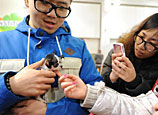
 |
| (File Photo) |
Key Words:online;dirty words;language
Related Reading:
>>2012: What's Online in China?
>>China needs to be vigilant against linguistic invasion
Dirty words related to human sex organs are seldom used in face-to-face conversation, but they can be very popular in the virtual world of the Internet.
Diao si, literally meaning a man's pubic hair, has gone viral lately among Chinese netizens, including educated women, who use it to mean have-nots and weaker groups in general.
The term is so popular that it has spilled over from the Internet and is sometimes used in public, in personal conversations.
When I first heard some young ladies use this and related dirty words to my face, I was shocked and their good image was totally ruined in my mind. It was they, then, who laughed at my "ignorance" of the origin of these filthy words on the Internet.
In his microblog, renowned film director Feng Xiaogang last week criticized the use of this vulgar slang, but he himself then became the victim of an online onslaught by those who are addicted to such crude language.
I wonder whether these fashionable men and women would ever have used these words in public had they not first been used in the virtual world, where "faceless" talk emboldens people to go to extremes in their vocabulary. My provisional answer to my own question is "no."
This brings us to the ugly side of the Internet: When people don't see each other, courteous and cultured behavior is no longer something to be cherished.
That's why I try to distance myself from the Internet as much as possible.
I don't even have a computer at home. There's no point in talking to someone who is "faceless."
















 Farmers in E China's Fujian prepare for spring sowing
Farmers in E China's Fujian prepare for spring sowing


![]()
